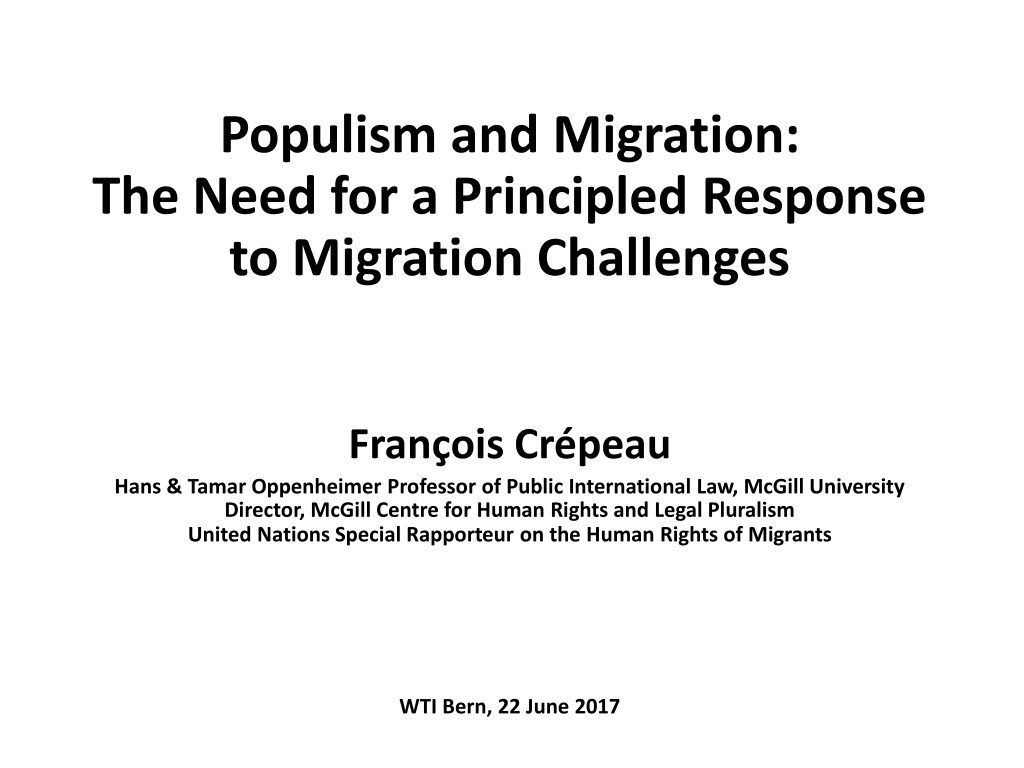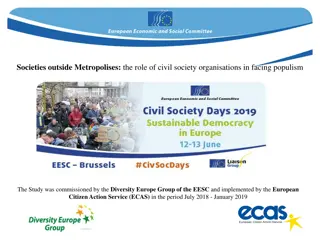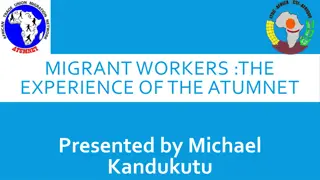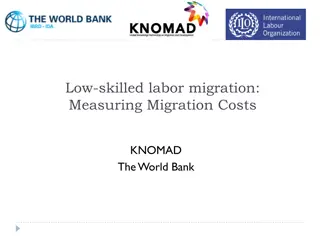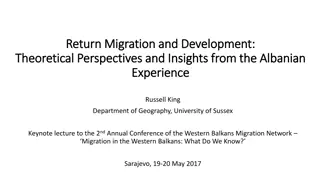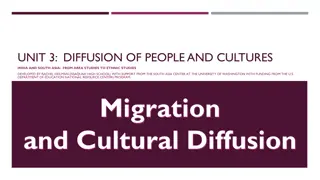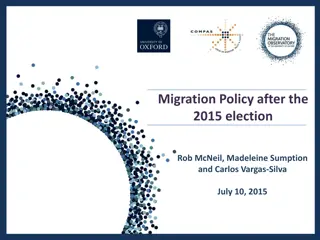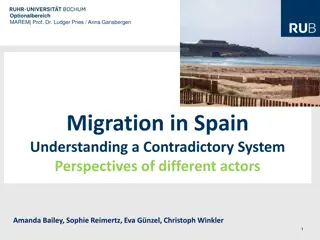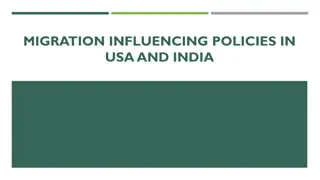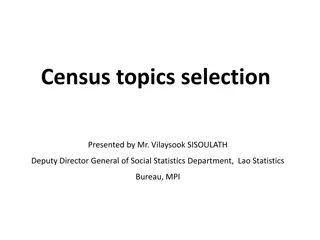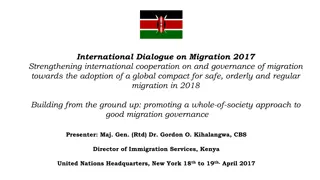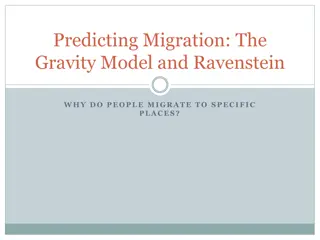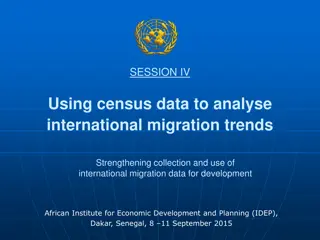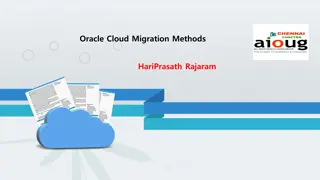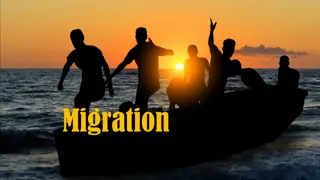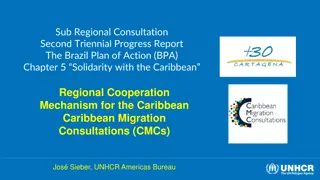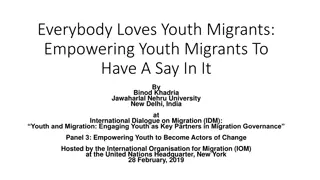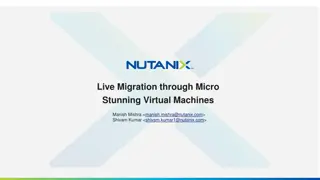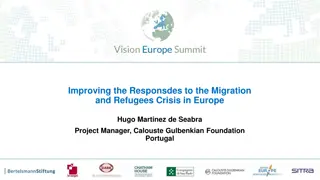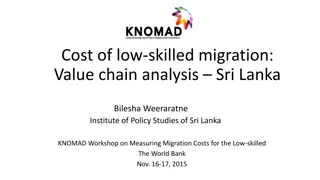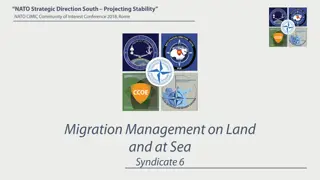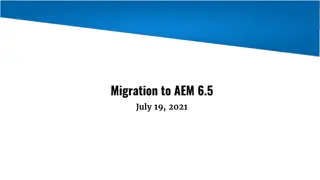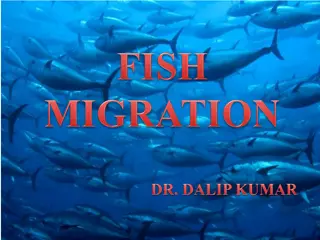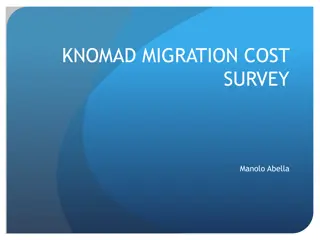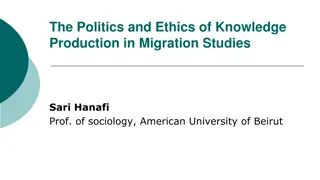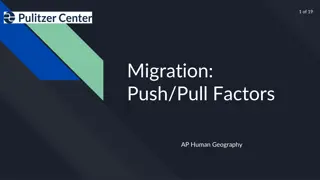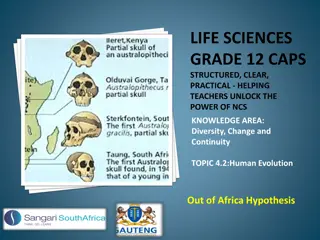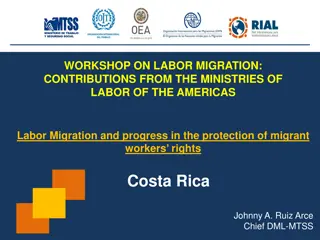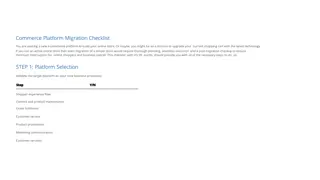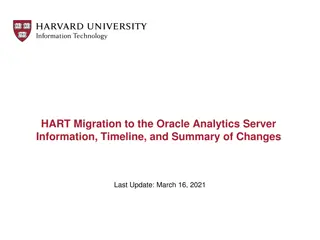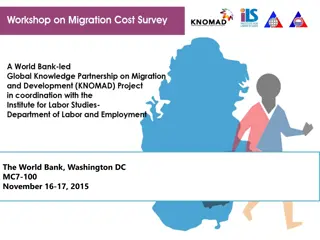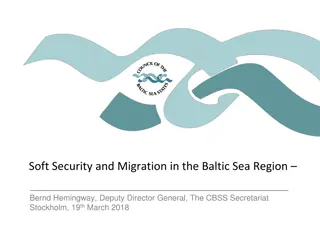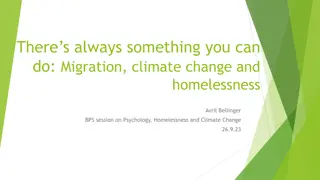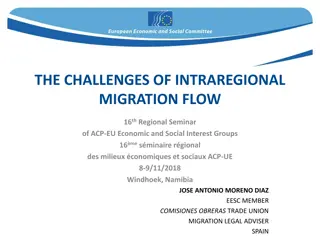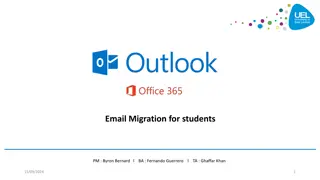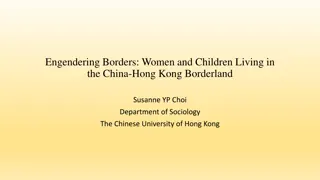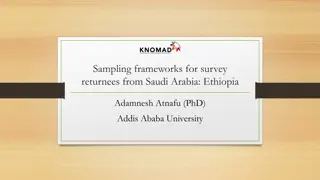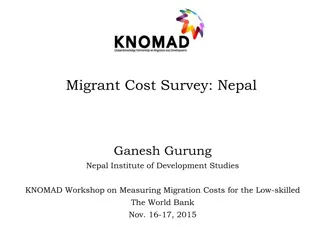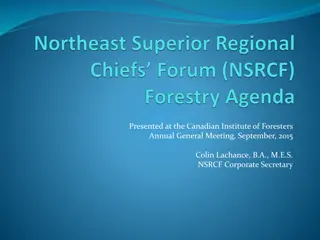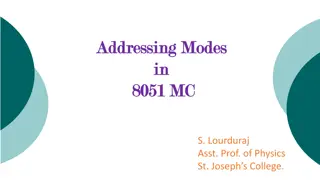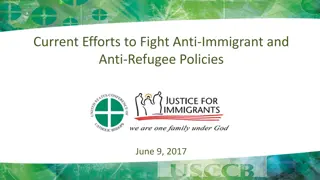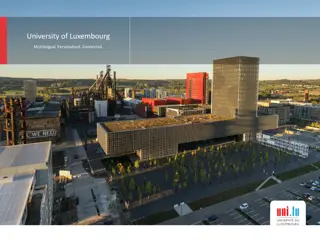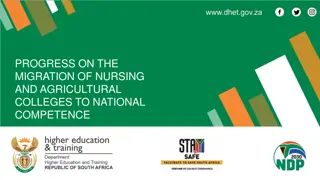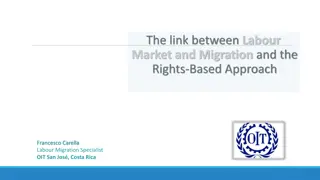Addressing Populism and Migration Challenges: A Principled Approach
Populism, defined as a political ideology emphasizing the interests of the common people over established institutions, plays a significant role in shaping responses to migration. Economic inequality, cultural cleavages, and social deprivation contribute to the rise of populist sentiments, leading to xenophobia and anti-establishment rhetoric. Understanding these dynamics is crucial in formulating principled responses to migration challenges.
Download Presentation

Please find below an Image/Link to download the presentation.
The content on the website is provided AS IS for your information and personal use only. It may not be sold, licensed, or shared on other websites without obtaining consent from the author. Download presentation by click this link. If you encounter any issues during the download, it is possible that the publisher has removed the file from their server.
E N D
Presentation Transcript
Populism and Migration: The Need for a Principled Response to Migration Challenges Fran ois Cr peau Hans & Tamar Oppenheimer Professor of Public International Law, McGill University Director, McGill Centre for Human Rights and Legal Pluralism United Nations Special Rapporteur on the Human Rights of Migrants WTI Bern, 22 June 2017
A definition of populism ( ) a loose political ideology emphasizing faith in the decent , ordinary or little people over the corrupt political and corporate establishment, nationalist interests (Us) over cosmopolitanism cooperation across borders (Them), protectionist policies regulating the movement of trade, people and finance over global free trade, xenophobia over tolerance of multiculturalism, strong individual leadership over diplomatic bargaining and flexible negotiations, isolationism in foreign and defense policies over international engagement, traditional sex roles for women and men over more fluid gender identities and roles, and traditional over progressive values. Ronald Inglehard & Pippa Norris (2016) Trump, Brexit, and the Rise of Populism: Economic Have-Nots and Cultural Backlash Faculty Research Working Paper Series John F. Kennedy School of Government https://research.hks.harvard.edu/publications/workingpapers/Index.aspx
A definition of populism The cultural cleavage divides Populism from Cosmopolitan Liberalism, which favors the free flow of people, ideas, capital, and cultures across national borders, and pluralistic forms of governance based on respect for the protection of minority rights and checks and balances in decision-making processes. Ronald Inglehard & Pippa Norris (2016) Trump, Brexit, and the Rise of Populism: Economic Have-Nots and Cultural Backlash Faculty Research Working Paper Series John F. Kennedy School of Government https://research.hks.harvard.edu/publications/workingpapers/Index.aspx
Economic Inequality Perspective Profound changes transforming the workforce and society in post-industrial economies Rising economic insecurity and social deprivation among the left-behinds fuel popular resentment against the political class The less secure strata of society : low-waged unskilled workers, long-term unemployed, households dependent on shrinking social benefits, residents of public housing, single-parent families, and poorer white populations living in inner-city areas with concentrations of immigrants Susceptible to the anti-establishment, nativist, and xenophobic scare-mongering of the populist discourse, blaming Them for stripping prosperity, job opportunities, and public services from Us
Cultural Backlash Perspective Not a purely economic phenomenon A reaction against progressive cultural change, as they: Sense decline Reject the rising tide of progressive values Resent the displacement of familiar traditional norms Sectors once culturally predominant in Western Europe react angrily to the erosion of their privileges and status A counter-revolutionary retro backlash, especially among the older generation, white men, and less educated sectors: rights revolution
A Challenge to Democratic Governance Majority rule is supreme: Andr Laignel Rejection of accountability to independent institutions challenging the majority decision: Courts and tribunals, NHRIs, Ombudspersons, IOs, CSOs Contest the legitimacy of HR: individual can challenge majority Rejection of the post-war democratic architecture based on three pillars: Political representation Human Rights Rule of Law Especially, denunciation of any criticism of how authorities treat migrants Migrants human rights are dismissed Minister Jason Kenney
Democracies cannot represent foreigners Migrants do not vote, rarely protest publicly, complain little Cannot reward or punish politicians: politically inexistent Migrants fear detection, detention, deportation: going public is not an option Migrants main goal is the success of the migration project: survive and send money home: they move on Structural limit of electoral democracies: like the poor in the 19thC. Electoral systems create no incentive for protecting migrants rights: Voting rights do change narrative Women, LGBTIQ, Aboriginals, persons with disabilities Defending migrants rights is seen as political suicide Strategic advisers Alain Jupp
Irresponsible political discourses Absence of political responsibility for anti-immigrant discourse (except partly US) Nationalist populist discourse based on constructed and uncontradicted myths : stereotypes, fantasies, threats Migrants don t increase: unemployment, crime, illnesses, insecurity Populist programs: protecting national identity against them Anti-immigration discourses normalised Absence of push-back from a constituency Nationalist populist discourse focused on identity issue Words matter as language conveys meaning: Always portrayed as illegal , not worker or student or child Liquid language: flows, waves, tides, floods, trickling, streaming, swelling, pouring, seeping, pooling, drowning, containing Anonymous threatening mass: no individuality, dehumanising
Migrants precariousness is constructed Migrants come because there s a labour market (underground or regular): unacknowledged pull factor Competitiveness in agriculture, construction, hospitality, care-giving, extraction, fisheries Undocumented migrants: Violation of administrative regulations: not a crime Trend: criminalisation: securitisation, detention, externalisation Undocumented migration is policy-driven: Globalisation: delocalisation of working conditions Repression pushes underground, increasing vulnerability/pliability From zero-tolerance to harm-reduction Temporary migrant workers: Policies shape a dangerous employment relationship: sponsorship, unions Objective: extracting maximum labour for minimum cost States can change policy framework: what incentives?
Human rights speech has little traction J. Haidt, The Righteous Mind Moral decision: emotion rules over reason Moral decision criteria : freedom, fairness, care, authority, loyalty, sanctity Division between liberals et conservatives Conservative issues: security, citizenship, charity HR discourse is typically liberal: conservatives are unconcerned Dialogue of the deaf on undocumented migration: Liberals: they live among us Conservatives: they broke the law We don t care about people we don t relate to: invisibility breeds exclusion
Migrants need empowerment As long as migrants won t vote and participate in the public debates, fighting fantasies will be difficult: See how women still fight sexist stereotypes, with half the vote Only the voice of migrants themselves could undo this stalemate: Need to speak up in media, public debates, ultimately on political stage The discussion must become personal: citizens need to know a migrant HR are best defended by holders: women, Aboriginals, LGBTIs Liberal agenda: EMPOWERMENT of migrants Idea for future: voting rights for long-term residents (5Y)
Empowerment means having a voice Outside political stage, migrants voice must be carried by: Independent institutions: courts and tribunals, NHRIs, ombudspersons, ADR Civil society: CSOs, churches, unions, employers International organisations Public services (labour inspectors, social workers, school directors, health care providers, access to justice, local police ): Firewalls , All-of-Government approaches Cities: Local citizenship : NYC s all New Yorkers
Towards a Global Compact on Migration Restricting mobility is part of the problem, not the solution Fighting the smugglers : market results from barriers to mobility Repression entrenches underground markets, subsidises smuggling operations States need to take over the mobility market and offer regulated mobility solutions: visa facilitation and liberalisation: Underground labour and smuggling markets reduced Migrants can better organise and defend their rights Accountability mechanisms: courts, tribunals, NHRIs, ombudspersons, labour inspectors, firewalls Better data collected and analysed Costs reduced and investments redirected Public discourse can focus on benefits of migration for all Long term strategic vision and planning of mobility policies
Agenda 2035 on Facilitating Human Mobility 1. Offer regular, safe, accessible and affordable mobility solutions to all migrants, regardless of status or skill level 2. Protect the labour rights and human rights of all workers, including migrant workers, regardless of status and circumstances 3. Respect human rights in border control policies and practices and establish accountability mechanisms 4. End detention as a border management and deterrence tool against migrants 5. Provide effective access to justice for all migrants 6. Ensure easy access for all migrants to basic services, including education and health 7. Protect all migrants from all forms of discrimination and violence, including racism, xenophobia, sexual and gender-based violence, and hate speech 8. Increase disaggregated data collection and analysis on migration and mobility
Conclusion: Anti-immigration populism is rear-guard battle The silver linings show a generational change: Artists Business community Media CSOs, INGOs Unions Courts, tribunals, NHRIs, ombudspersons, healthcare providers Technology changes Youth Migrants: agency, resilience, courage, imagination, grit Change in the narrative: Migrant neither poor victim, nor criminal Agent of their own future and that of their children
